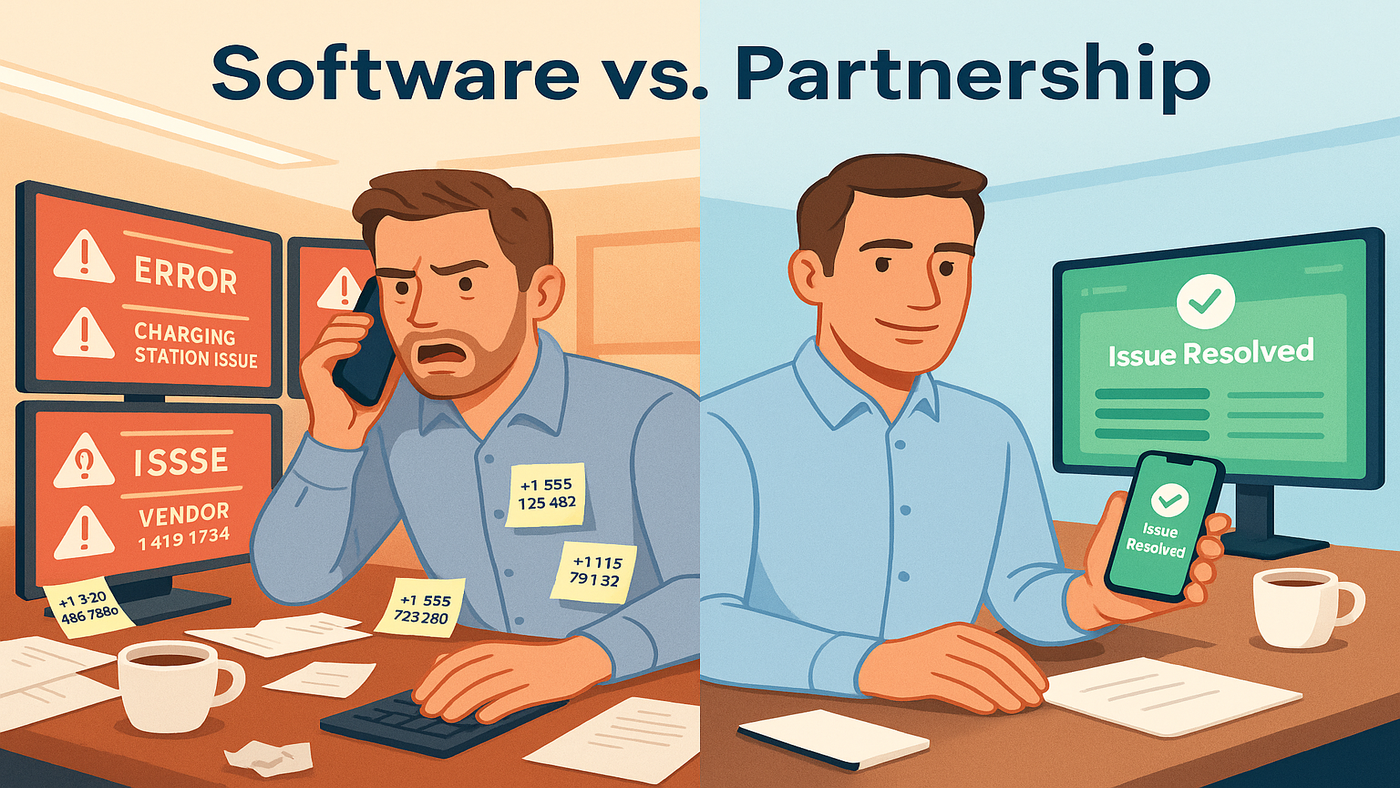
Beyond Software: Why Your EV Charging Needs a Partner, Not Just a Platform
We've been in the EV charging software business long enough to see how the industry has evolved. When we started, most of our conversations were about features, integrations, and dashboards. Today? They're about uptime, support response times, and who actually picks up the phone when something goes wrong.
Here's what we've learnt: great software is just the beginning. What really matters to our customers is what happens after they sign up.
The reality check: When charging fails, who do you call?
Picture this: It's 7 AM on a Monday. Your employees are arriving at work, plugging in their company cars, and... nothing. Three of your charging points aren't responding. Your delivery van driver needs to be on the road in two hours, but his vehicle is sitting at 15% charge.
If you're using a traditional software-only platform, you're probably logging into a dashboard, checking error codes, maybe submitting a support ticket, and hoping for a callback. Meanwhile, your operations are grinding to a halt.
This scenario plays out thousands of times every week across the UK. Harvard research shows that public charging succeeds only 78% of the time, and workplace charging faces similar challenges when issues aren't resolved quickly.
What we're hearing from our customers
The feedback we get isn't really about software features anymore. It's about experiences:
"We needed someone we could actually talk to when things went wrong."
"Other platforms gave us great dashboards, but we still felt like we were managing everything ourselves."
"When our charge points failed, we spent more time chasing different vendors than actually running our business."
Sound familiar? If you've been managing EV charging for a while, you've probably had similar experiences.
The evolution of EV charging support
Here's where the industry has shifted, and why we've adapted our approach at Clenergy EV.
Traditional software approach:
- License the platform
- Get access to monitoring tools
- Handle issues yourself
- Coordinate with multiple vendors
- Hope for timely support responses
What businesses actually need:
- Reliable charging that just works
- Someone to call who takes ownership
- Proactive problem-solving
- Coordination handled behind the scenes
- Guaranteed response times
We realised that providing excellent software wasn't enough if our customers were still struggling with the operational side. That's why our Pro licence includes things like 24/7 helpdesk support where we don't just help you reset charge points. We hold the ticket until there's a real resolution, keeping you updated throughout the process.
Why "managed service" isn't just a buzzword
When we talk about managed service, we're not talking about taking control away from you. We're talking about taking responsibility.
Here's the difference: If a charge point fails with a traditional software provider, you get notified and then figure out what to do next. With our approach, you get notified that we're already working on a solution.
Real example: One of our customers (a logistics company with a mixed fleet) had a charging unit start throwing error codes at 6 PM on a Friday. Their weekend delivery schedule depended on those vehicles being charged by Monday morning.
Instead of leaving them with a support ticket and a weekend of worry, our team coordinated with the hardware vendor, arranged an emergency callout, and had the issue resolved by Saturday afternoon. The customer got regular updates, but didn't have to manage any of the vendor relationships or technical troubleshooting.
The hidden complexity of "just software"
The truth is, EV charging infrastructure is more complex than most people realize. It's not like managing a fleet management system or accounting software. When charging fails, it impacts operations immediately and tangibly.
Consider what's actually involved when something goes wrong:
- Diagnosing whether it's a software, hardware, or connectivity issue
- Coordinating between different vendors (hardware manufacturer, connectivity provider, payment processor)
- Managing utility relationships for load balancing issues
- Handling driver reimbursements and complaints
- Ensuring compliance with evolving regulations
Software platforms can provide the tools to see these issues, but they don't handle the coordination and resolution. That's where the real operational burden sits.
What full support looks like in practice
At Clenergy EV, we've built our Pro service around what customers actually tell us they need:
Human-first support: When you call, you speak to someone who understands your setup and can take immediate action, not just log a ticket.
End-to-end ownership: We coordinate with hardware vendors, connectivity providers, and utilities so you don't have to manage multiple relationships.
Proactive monitoring: Our team watches for issues before they impact your operations, often resolving problems before you even know they exist.
Real accountability: We track resolution times and keep you updated throughout the process, because we know your business depends on reliable charging.
The business case for comprehensive support
We've seen the difference this approach makes for our customers. Network Rail, for example, manages thousands of vehicles across multiple sites. They chose a comprehensive service approach because they needed guaranteed uptime and single-point accountability. Not because they wanted to give up control, but because they wanted to focus on running their railway, not managing charging infrastructure.
Companies using managed charging services typically see 99.9% uptime compared to the 78% success rate of self-managed solutions. More importantly, they spend their time on their core business instead of becoming EV charging experts.
Finding the right balance
We're not saying software-only solutions are wrong for everyone. Some organisations have the internal expertise and resources to manage complex charging operations effectively. But we've found that most businesses (whether they're running a single site with five charge points or a multi-site operation with hundreds) want reliable charging without the operational overhead.
That's why we've evolved our offering. Our software is still at the core of what we do, but we've wrapped it in the support and services that make EV charging actually work for businesses.
The bottom line
Great EV charging software should be invisible. It should just work, allowing you to focus on your business rather than on managing charge points. But when things go wrong (and they will), you need more than great software. You need a partner who takes ownership of getting you back up and running.
Whether you're considering your first EV charging installation or looking to improve your existing setup, ask yourself: When something goes wrong at 6 AM on a Monday, who are you going to call? And more importantly, will they actually be able to help?
At Clenergy EV, we believe that question should have a simple, reliable answer. Because when it comes to EV charging, the platform is just the beginning. It's the partnership that makes all the difference.



